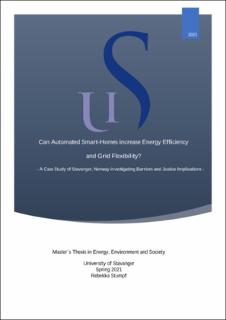| dc.description.abstract | Artificial intelligence (AI) advocates deem it essential for the energy transition. Such a complex and penetrative set of technologies that impact everyday lives must be implemented cautiously. This thesis examines barriers to the diffusion of AI-based, automated smart homes at the household and industry scales. It examines an AI system that acts as an intermediary between households, electricity distribution companies and energy producers for domestic energy efficiency and grid flexibility. The thesis focuses on the ethical and justice implications of AI. It draws on a case study of Stavanger in Norway to investigate how AI can fairly enable energy efficiency and grid flexibility. The methods used include a small questionnaire survey, semi-structured interviews, and secondary research. Grounded theory is used to theorise barriers for households, qualitative content analysis identifies barriers for industry, and findings are also interpreted through an energy justice lens. The findings reveal multi-layered barriers and justice concerns related to the diffusion of automated smart-homes. The main barriers for households include functionality, saturation, and data management. For industry, barriers relate to economic, technical, regulatory, and market aspects. Justice and ethical implications linked with AI in the energy context are identified in terms of distributive, procedural and recognition streams of energy justice. The thesis argues that economic incentives, supportive policies, and an enabling market to involve actors are necessary to enable complex AI systems feasible for smart grids. For consumers, technologies must target a wide range of lifestyles and preferences for sufficient market saturation to make AI systems viable. Moreover, ethical AI requires a combination of regulations anchored in energy policies and the development and operationalisation of internal guidelines. The thesis concludes that while AI can aid transitions to low-carbon societies, failure to account for the humans involved and affected by its roll-out risks doing more harm than good. | |
